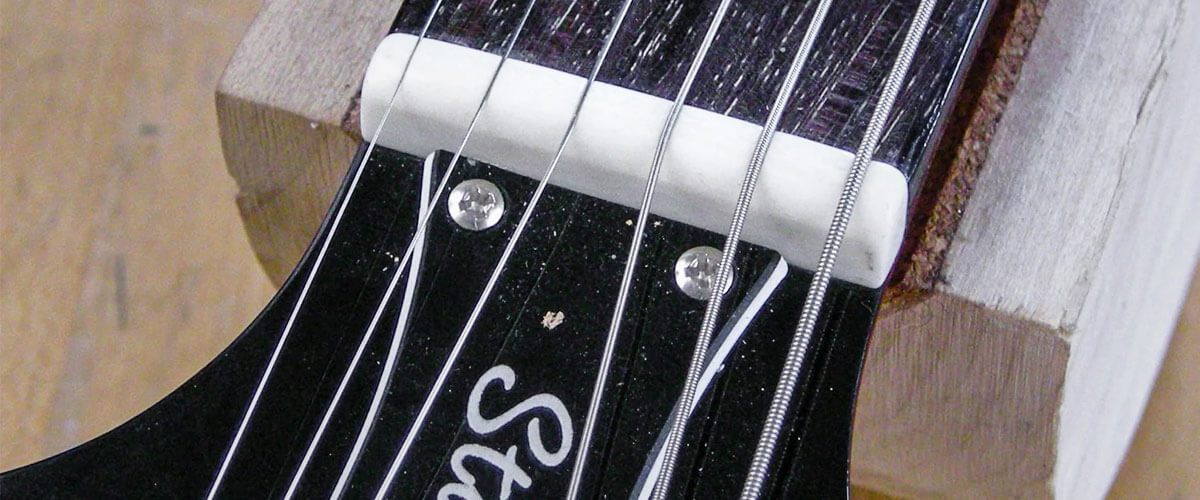The guitar nut, though small, plays a critical role in the overall sound and performance of your instrument. It anchors the strings at the headstock, affecting the tone, sustain, and tuning stability. One often debated topic among guitar enthusiasts and luthiers is the material choice for this essential component – particularly, the “tusq vs bone nut” argument. Both these materials have unique characteristics, and understanding their pros and cons can guide you toward a better decision that suits your playing style and tone preference.
Tusq nuts

Tusq nuts, produced by Graph Tech, are a popular guitar nut material choice for guitar players worldwide. They’re a synthetic material made from a proprietary substance, dubbed “TUSQ,” that mimics many of the best qualities of bone nuts and even enhances some of them.”
Characteristics and advantages of tusq nuts:
- Self-lubricating: One major advantage of Tusq nuts is their self-lubricating nature. This reduces friction between the strings and the nut, leading to better tuning stability and fewer string breakages.
- Consistency: Unlike natural bone, Tusq is free of any impurities or inconsistencies. This results in a reliable, uniform density across the nut, ensuring a consistent transfer of vibrations from the strings to the guitar’s neck.
- Wide frequency range and balanced tone: Tusq nuts provide an even tone without over-emphasizing low, mid, and high frequencies. The clear, full, and rich sound offers an excellent harmonic response.
Considerations and limitations of tusq nuts:
- Less organic tone: Some experts believe they lack the warmth and organic feel that bone nuts provide.
- Durability: Although Tusq is quite hard and durable, it can wear down over time, especially under heavy usage.
Bone nuts
Among the various guitar nut type’, bone nuts have been traditionally utilized for their unique acoustic properties. As the name suggests, these nuts are made from animal bone — usually cow or buffalo. They’re a natural and organic material, and many musicians believe this gives a warmer and more natural tone compared to synthetic alternatives.
Characteristics and advantages of bone nuts:
- Natural material: Bone is an organic material, and many specialists believe this gives a warmer and more organic tone compared to artificial analogs.
- Improved vibration transfer and sustain: Bone nuts are dense and hard, providing excellent vibration transfer from the strings to the guitar’s neck, which can lead to increased sustain and a richer sound.
- Warm and balanced tone: Like Tusq, bone nuts offer a balanced tone across frequencies. However, many players find bone to deliver a warmer, more complex sound with additional depth.
Considerations and limitations of bone nuts:
- Climate sensitivity: Being an organic material, bone is susceptible to environmental conditions. It can shrink or expand with changes in humidity and temperature, potentially causing tuning issues.
- Inconsistent density: Each bone nut is unique, and its density can vary. This may lead to slight inconsistencies in tone and sustain across different bone nuts.
Comparing tusq and bone nuts

| Features | Tusq Nut | Bone Nut |
|---|---|---|
| Tonal quality | Balanced, bright, clear tone | Warmer, fuller, complex tone |
| Playability | Excellent tuning stability, uniform action | Rich sound, sustain, climate-sensitive action |
| Durability | Resistant to wear, but may wear over time | Durable but can wear faster |
| Maintenance | Less maintenance, replacement necessary | More maintenance, can be adjusted over time |
In conclusion, the ‘bone nut vs. tusq’ debate boils down to personal preference, playing style, and the desired tonal output. Both materials have unique characteristics that influence the guitar’s tonal output, playability, and durability.
FAQ
Which nut material provides better sustain?
Both Tusq and bone nuts offer excellent sustain due to their dense nature. However, some specialists and experienced players with many years of experience find that bone nuts may have a slight edge in sustain due to their natural composition. It’s worth noting that other factors, like string gauge and setup, also significantly impact sustain.
Can I expect a noticeable difference in sound switching between nuts?
Yes, the nut material can have a subtle but noticeable impact on the overall tone of your guitar. Tusq tends to provide a bright, clear tone, while bone delivers a warmer, more complex sound.
Are there specific playing styles or music genres that benefit more from Tusq or bone nuts?
The choice between Tusq and bone nuts often comes down to personal preference, and the same goes for the tusq vs bone saddle debate. However, guitarists who play genres requiring precise tuning stability (like heavy metal or progressive rock) might prefer Tusq for its self-lubricating nature. On the other hand, players seeking a more organic and complex tone, often found in blues or folk, might lean towards bone nuts.














